Best Real Estate CRM Software: 7 Top Picks in 2025
TL;DR
• Real estate CRMs stop deals from slipping by linking clients, properties, and follow-ups in one place.
• We tested 20+ platforms; only 7 worked smoothly for day-to-day real estate workflows.
• Picks include both industry-specific CRMs and flexible sales CRMs you can tailor to property deals.
• Use this guide to skip the trial-and-error and find a CRM that helps you close more smoothly.
Real estate is a relationship business, but those relationships can be messy to manage. One buyer wants daily updates on new listings. Another seller needs reminders about staging photos. Add in lenders, inspectors, and referrals, and suddenly you’re juggling dozens of conversations across calls, emails, and texts.
That’s where real estate CRM software comes in. The right tool connects people, properties, and follow-ups in one place and makes agents’ lives easier with features such as automated reminders and IDX websites.
We tested 20+ CRMs and narrowed it to 7 finalists. Each shines for a different need and this guide helps you pick the one that will save you time and win more deals.
The best real estate CRM software in 2025
- Wise Agent for commissions, forms, and real estate–specific workflows
- Follow Up Boss for managing high volumes of online leads
- LionDesk for built-in texting, calling, and video messaging
- Real Geeks for IDX websites with a connected CRM
- Zoho CRM for customizable property pipelines and automation
- HubSpot CRM for a free starting point that scales with your business
- Freshsales for AI-powered lead scoring and smart follow-ups
What is real estate CRM software?
Real estate CRM software keeps your clients, listings, and deals connected in one system, so nothing slips through the cracks. Instead of juggling spreadsheets, sticky notes, and endless texts, you get a central hub that remembers every detail for you.
- Tracks leads from first inquiry through closing
- Connects people, properties, and tasks in one view
- Automates reminders for follow-ups, showings, and renewals
- Helps teams route leads and share client updates
- Frees up your time to focus on selling, not admin
Why real estate teams need a CRM
Real estate is a team sport. You’ve got agents chasing leads, coordinators scheduling showings, and brokers keeping an eye on closings. Without a shared system, information scatters across inboxes and sticky notes, and that’s when deals stall or clients slip away.
CRMs solve the bigger headaches, such as:
- Accountability without finger-pointing. A CRM logs who last contacted a client, when, and what was said—so you don’t waste time asking “Did anyone follow up on this?”
- Pipeline clarity across multiple agents. When half your team is working buyers and the other half sellers, a CRM shows the full transaction flow, not just an individual’s slice.
- Fewer duplicate efforts. Without a CRM, two agents can easily pitch the same buyer. With one, lead distribution and notes make sure you’re not stepping on each other’s toes.
- Smarter coaching. Brokers can see which activities actually move deals forward—like how many showings convert to offers—so they can train the team on what works instead of relying on gut feel.
A CRM is about giving the entire office one version of the truth. That means less chaos, less overlap, and a smoother client experience from first inquiry to closing.
Features to look for in real estate CRM
How we evaluate and test real estate CRM apps
We tested each CRM as if we were agents: created accounts, imported leads, ran mock listings, and worked deals from inquiry to close. Here’s what we scored them on:
- Instant lead capture & auto-response: Does it pull in leads from portals/forms and reply with SMS or email right away?
- Built-in telephony & SMS: Native click-to-call and texting, with logs tied to the contact.
- Transaction checklists & e-signature: Custom workflows plus DocuSign/Dotloop integrations.
- Marketing automation: Drip emails, SMS, property alerts, and behavior-triggered campaigns.
- Contact segmentation & referrals: Tags, groups, reminders, and tracking who sends business your way.
- Unique real estate perks: MLS/IDX feeds, saved searches, or other agent-focused features.
We judged tools not just on what they promised, but how they performed in a real agent’s workflow. If a feature slowed us down, buried us in clicks, or felt bolted on, it didn’t make the cut.
Best CRM for real estate comparison chart
| Product | Best for | Free Plan | Pricing* |
| Wise Agent | Commissions & forms | No | $32/user/month |
| Follow Up Boss | Managing online leads | No | $69/user/month |
| Liondesk | Built-in texting, calling, video | No | $25/user/month |
| Real Geeks | IDX websites + CRM | No | $299/2 users/month |
| Zoho CRM | Customizable pipelines + automation | Yes, up to 3 users | $14/user/month |
| HubSpot CRM | Free all-in-one CRM | Yes, up to 2 users | $15/user/month |
| Freshsales | AI lead scoring & follow-ups | Yes, up to 3 users | $9/user/month |
*Pricing starts at
Best real estate CRM comparison chart
Best real estate CRM software for commissions and forms
Wise Agent
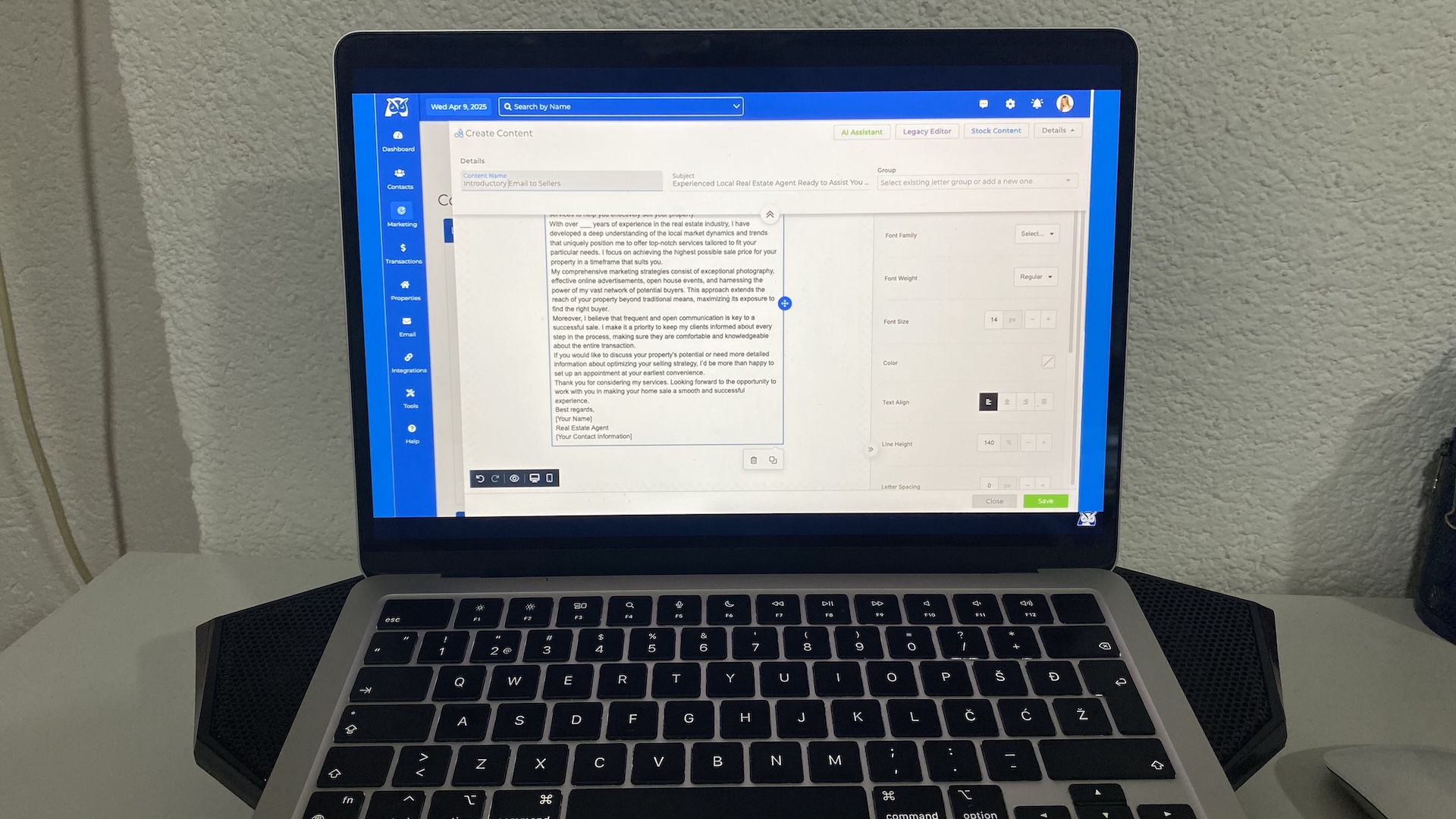
Pros
- Text codes and auto-responders capture leads the second they hit your system
- Prebuilt checklists and campaigns tailored to real estate workflows
- Commission tracking built right into the CRM—no spreadsheets needed
Cons
- Interface feels dated compared to newer tools
- Automation is solid but not as advanced as higher-end CRMs
Wise Agent earns its place by thinking like an agent, not just a software vendor. Lead capture is a good example: you can assign unique text codes to different marketing channels—yard signs, Facebook ads, open houses—so when a lead comes in, you know instantly where it came from. Pair that with an auto-responder that fires off a text or email within seconds, and you’re engaging before competitors even see the alert.
The built-in telephony and SMS aren’t just “click-to-call.” Every message and call sits neatly in the contact timeline, and you can send bulk texts to a tagged group—say, all your open house attendees. That makes follow-up less of a scramble and more of a system.
Transaction checklists go beyond reminders. Brokers can create office-wide templates so every agent follows the same process—contingencies, disclosures, closings—keeping compliance airtight. Add DocuSign or Dotloop integration, and the paperwork moves in lockstep with the deal stages.
On the marketing side, Wise Agent comes preloaded with industry-specific drip campaigns: buyer onboarding, seller nurturing, even holiday greetings. You don’t start from scratch, but you can tweak templates to sound like you. It’s not a full-blown marketing suite, but it’s practical and saves hours.
The unique perk here is commission management. Most CRMs stop tracking once a deal closes, but Wise Agent logs commissions, splits, and broker fees right inside the system. That means your financial picture stays tied to your pipeline—not scattered across a separate spreadsheet.
Pricing
No free plan. One flat plan only at $32/user/month.
Helpful next steps
- Sign up for the Wise Agent free trial
Visit site
Go to Wise Agent's official website
Best real estate CRM software for managing online leads
Follow Up Boss
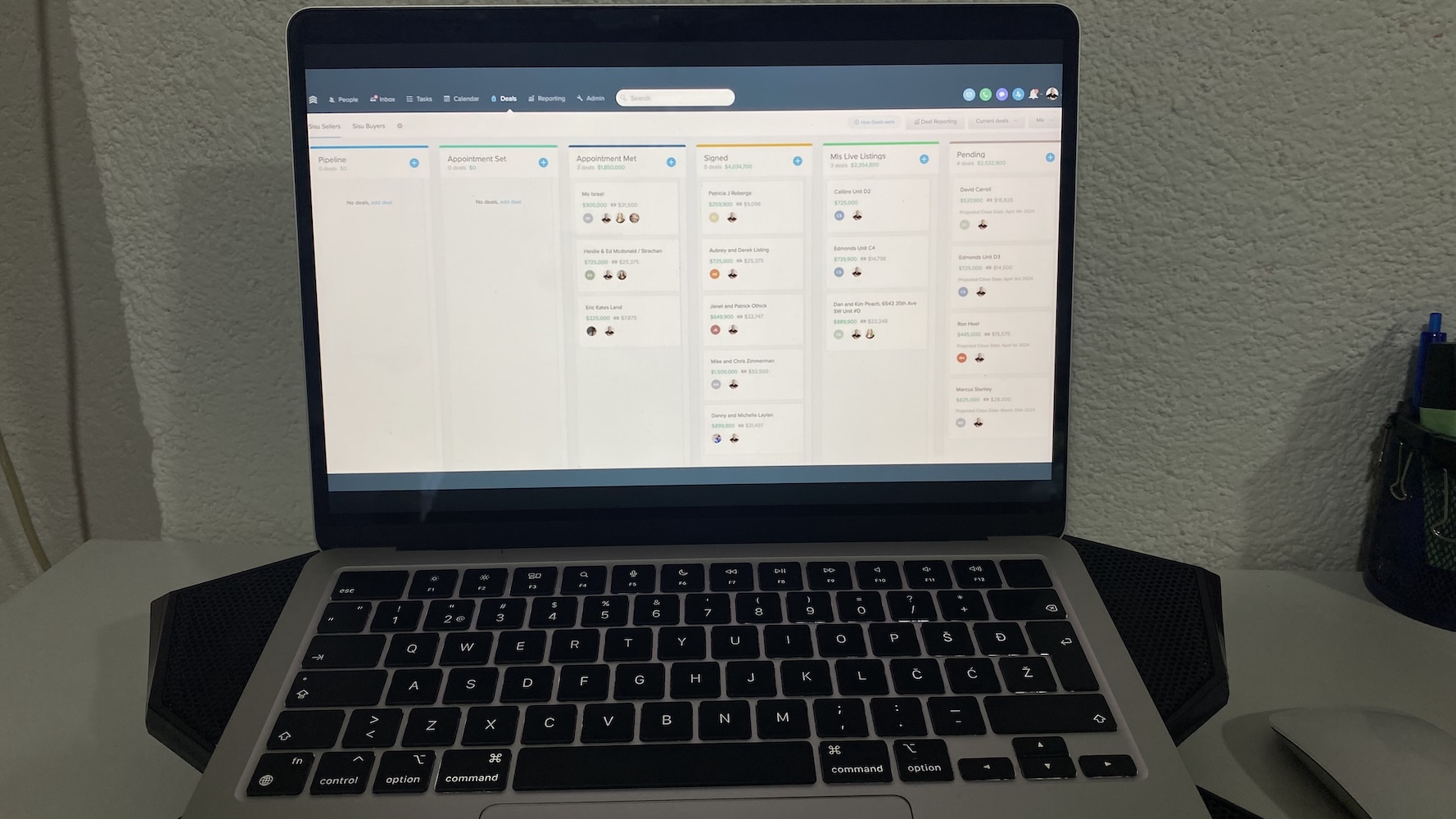
Pros
- Instant lead routing from Zillow, Realtor.com, Facebook, and more
- Auto-texts and emails fire within seconds of a new inquiry
- Team inbox shows response times for accountability
Cons
- Pricing starts high compared to other CRMs
- Interface can feel cluttered when multiple agents are active on the same thread
- Facebook lead ads require a Zapier-style workaround to sync smoothly
Follow Up Boss is built for speed. When a Zillow or Realtor.com lead lands it’s instantly imported, tagged, and routed to the right agent. Auto-texts and emails fire within seconds, so the prospect hears from your office before competitors even open the notification.
The shared inbox is a performance dashboard. Every call, text, and email threads into the contact record, and brokers can see response times down to the minute. One highlight: the system gently flags uncontacted leads after 10 minutes. It’s a small but effective nudge that keeps agents accountable without managers having to hover.
Marketing automation is tuned for real estate reality. You’ll find preloaded drip campaigns for new buyers, seller check-ins, and long-term nurture. They’re not marketing-suite fancy, but they do the job: timely touches that keep leads warm without burying you in setup.
Transaction checklists are lighter than a tool like Wise Agent—no commission tracking—but you still get task lists and reminders tied to each deal. Combined with tagging and segmentation, it’s easy to filter “hot buyers this week” or “past clients for referral outreach” and hit them with the right message.
The friction? Facebook leads took extra setup to sync reliably, and when several agents worked the same inbox thread, the interface got crowded fast. But those bumps aside, the system’s real edge is accountability. Being able to prove that your team contacts leads in under five minutes—consistently—is a metric every broker cares about, and Follow Up Boss makes it visible.
Pricing
No free plan. Paid tiers start at $69/user/month.
Helpful next steps
- Sign up for the Follow Up Boss free trial
Visit site
Go to Follow Up Boss' official website
Best real estate CRM software for built-in texting and calls
LionDesk
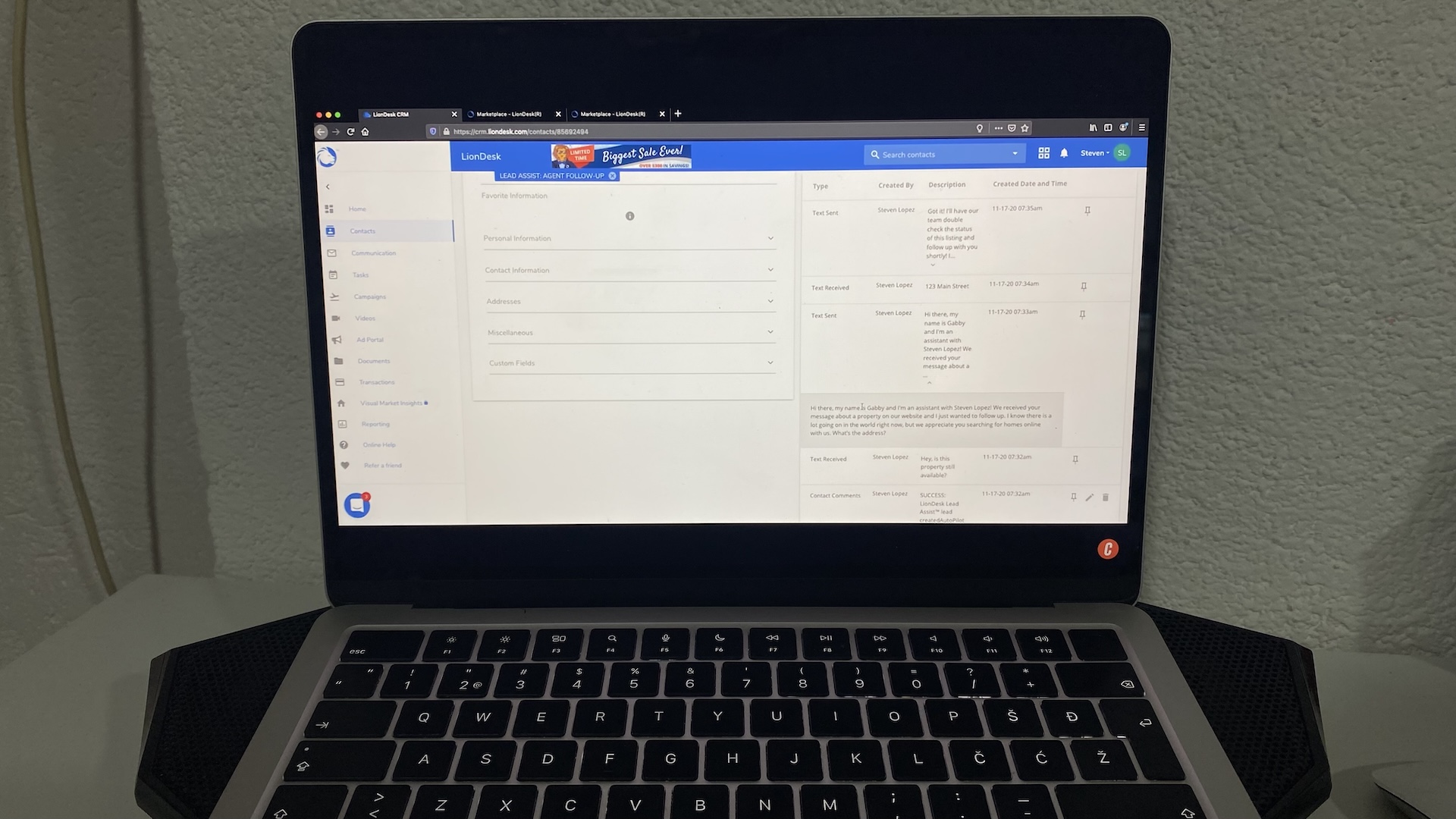
Pros
- Native texting, calling, and video messaging tools built right in
- Bulk texting saves time for open house follow-ups or event reminders
- Flat, affordable pricing compared to other real estate CRMs
Cons
- Interface feels dated and can get clunky with long message threads
- Limited marketing automation compared to newer players
- IDX integration requires extra setup or third-party tools
LionDesk leans hard into communication, and that’s exactly where many agents need help. Instead of bolting on SMS or paying for separate dialer apps, LionDesk bakes it all in. Click-to-call works from the contact record, every voicemail logs automatically, and you can send one-off or bulk texts straight from the dashboard. Following up with every attendee from last weekend’s open house takes minutes instead of hours.
Video messaging is a small but standout feature. You can record a quick walk-through or personal note and text or email it directly to a lead. It’s more personal than a templated email and helps you stand out when buyers are talking to three other agents at the same time.
Where it shines for teams is efficiency. The bulk SMS tool means you can send reminders to every buyer in a certain tag group—say, “condo leads under $400k”—without exporting lists or using outside software. The timeline view keeps all texts, calls, and emails tied to each contact, so when you open a record you see the full story, not scattered threads.
Marketing automation exists, but it’s lighter than competitors like Follow Up Boss or Zoho. You’ll get drip campaigns, email templates, and reminders, but don’t expect deep behavior-triggered workflows. Same with IDX: it’s possible, but you’ll need a third-party integration to make it smooth.
The friction points? The interface looks and feels a few years behind, and scrolling through long text threads isn’t as smooth as it could be. But there’s delight in the simplicity too—being able to fire off a bulk text within seconds or drop a video message into a follow-up feels like a cheat code for staying connected.
For agents who prioritize calls, texts, and face-to-face over dashboards and reports, LionDesk is a straightforward workhorse.
Pricing
No free plan. Paid plans start at $25/user/month.
Helpful next steps
- Sign up for the LionDesk free trial
Visit site
Go to LionDesk's official website
Best real estate CRM software with IDX websites built in
Real Geeks
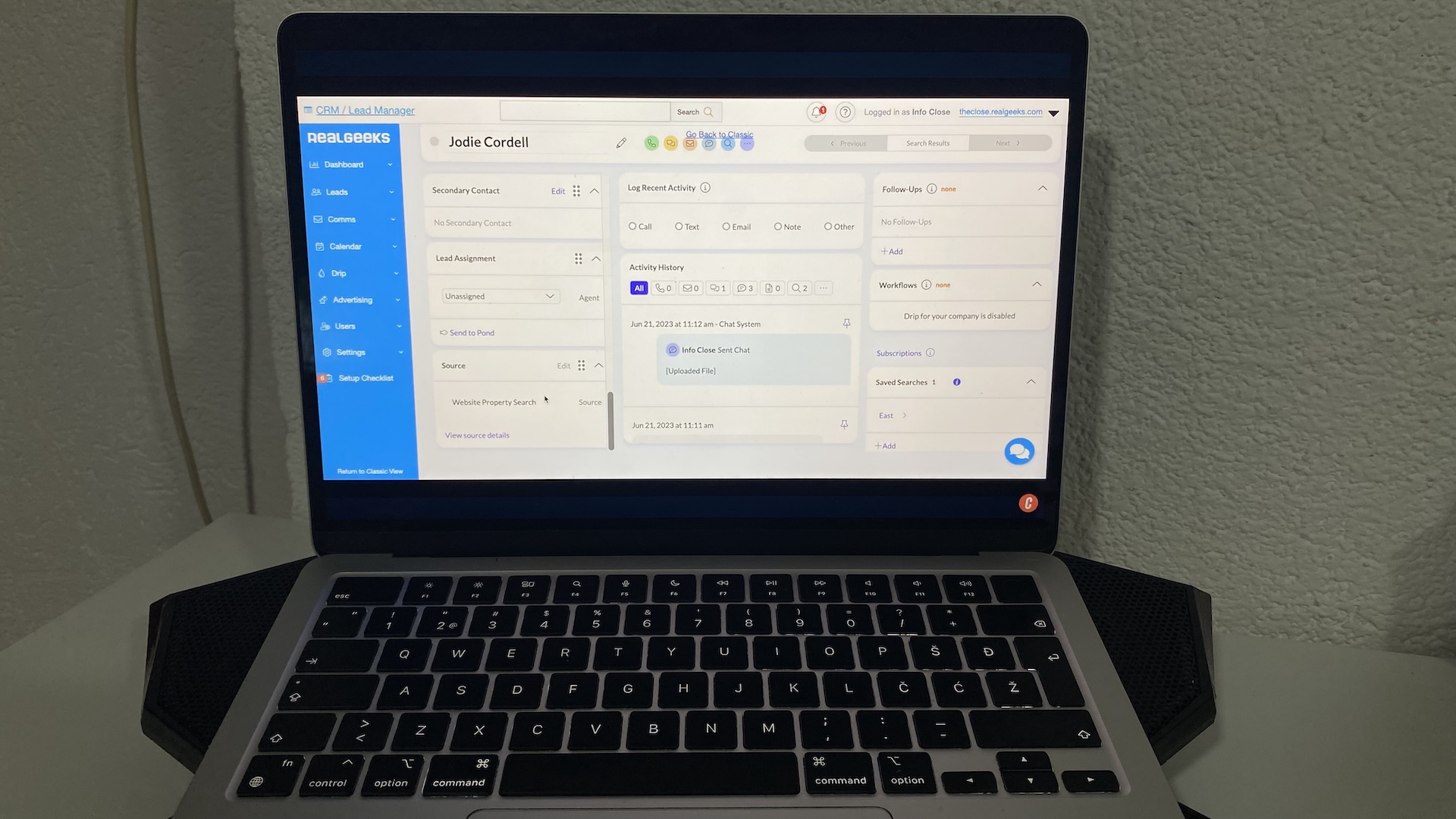
Pros
- IDX websites feed leads directly into the CRM
- Property search alerts keep buyers engaged automatically
- Solid balance of lead gen + CRM in one package
Cons
- Pricing starts high compared to standalone CRMs
- Interface feels dated and requires some setup help
- Limited flexibility if you already have a strong website
Real Geeks is a bundled ecosystem. You get an IDX website and a CRM tightly stitched together, so the moment a buyer registers to view listings, their info drops into the database.
From there, you can set automated property alerts based on saved searches—a feature that makes buyers feel like you’re sending them “hand-picked” listings, even when it’s fully automated.
The CRM itself is straightforward. Contact records show every site visit, saved search, and property view, giving you context before a call. Built-in texting and emailing mean you can follow up directly, and like LionDesk, messages log to the client’s timeline. For teams, there’s round-robin lead routing and assignment rules, though the UI can feel cramped once the database gets large.
The marketing side is practical rather than flashy. Prebuilt drip campaigns are included—buyer nurture, seller follow-up, re-engagement—but you can tweak them or build from scratch. The “property update” emails look like MLS alerts, which keeps them from feeling salesy. The downside? The design overall feels dated, and compared to tools like Follow Up Boss, the reporting is thinner.
Where Real Geeks shines is integration between lead gen and follow-up. You see exactly what listings someone viewed and how often. That context makes conversations warmer and lets you prioritize hot leads without guessing.
The friction is price and setup: at $299/month for two users, it’s a bigger investment than most CRMs, and many agents lean on Real Geeks’ support team to get the initial site polished.
Pricing
No free plan. Paid plans start at $299/month for 2 users.
Helpful next steps
- Request a Real Geeks demo
Visit site
Go to Real Geeks' official website
Best real estate CRM software for customizable workflows
Zoho CRM
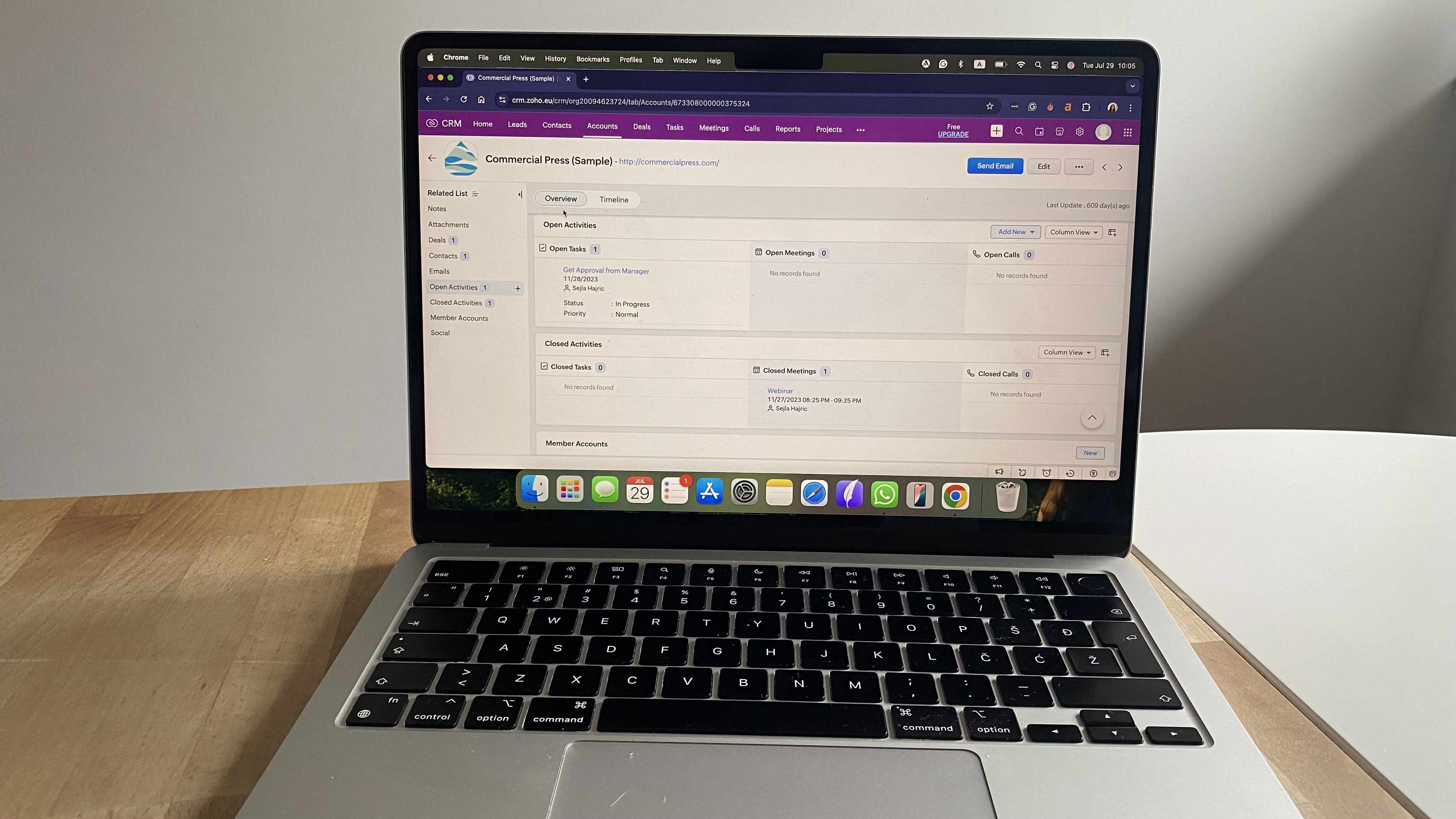
Pros
- Flexible modules you can tailor for listings, properties, or transactions
- Affordable entry-level pricing with a free tier for small teams
- Automation builder (Blueprint + Flow) handles follow-ups and reminders
Cons
- Setup takes time if you want it to feel “real-estate ready”
- UI can feel cluttered compared to lighter CRMs
- IDX and MLS integrations require workarounds or third-party tools
Zoho isn’t built just for real estate, but its flexibility makes it a strong fit if you’re willing to customize.
Out of the box, you get leads, contacts, deals, and tasks. With a little tweaking, you can turn those into property modules, transaction pipelines, and custom fields like MLS ID, listing price, or commission split. Once set, it behaves like a purpose-built real estate CRM without the higher monthly fee.
Lead capture works well through web forms and integrations. Zillow and Realtor.com don’t pipe in natively, but you can route those leads in via Zapier or Zoho Flow. The moment they land, you can set auto-responses to trigger SMS or email follow-ups. It takes about an extra hour of setup, but once configured, leads are tagged and tracked without manual entry.
The real differentiator is automation. Using Blueprint, you can map out transaction checklists step by step—offer submitted, inspection complete, contract signed—and attach reminders to each stage.
Add DocuSign integration, and you can manage the full lifecycle without leaving the CRM. It’s not as turnkey as Wise Agent, but the control means you can build workflows unique to your brokerage.
On the marketing side, Zoho outpaces most real-estate–specific CRMs. You can set up multi-channel drip campaigns—email, SMS, even WhatsApp—triggered by client behavior like “opened property email but didn’t reply.” Prebuilt templates aren’t real estate–focused, but once customized, you can run sophisticated nurture campaigns that match how your clients engage.
Segmentation is a highlight. Tags, custom fields, and smart filters let you build lists like “past clients with expiring mortgages” or “buyers who saved condos but haven’t booked a showing.” Combined with referral tracking, it’s easier to stay top-of-mind with the groups most likely to send business your way.
The friction is in setup and interface. It took time to strip away features meant for other industries, and the desktop layout can feel crowded once you’ve added custom fields. But once configured, Zoho gives you enterprise-grade power at SMB pricing.
Pricing
Free for up to 3 users. Paid plans start at $14/user/month, billed annually.
Helpful next steps
- Read our Zoho CRM review
- Sign up for the free Zoho CRM plan
Visit site
Go to Zoho's official website
Best real estate CRM software for a free starting point
HubSpot CRM
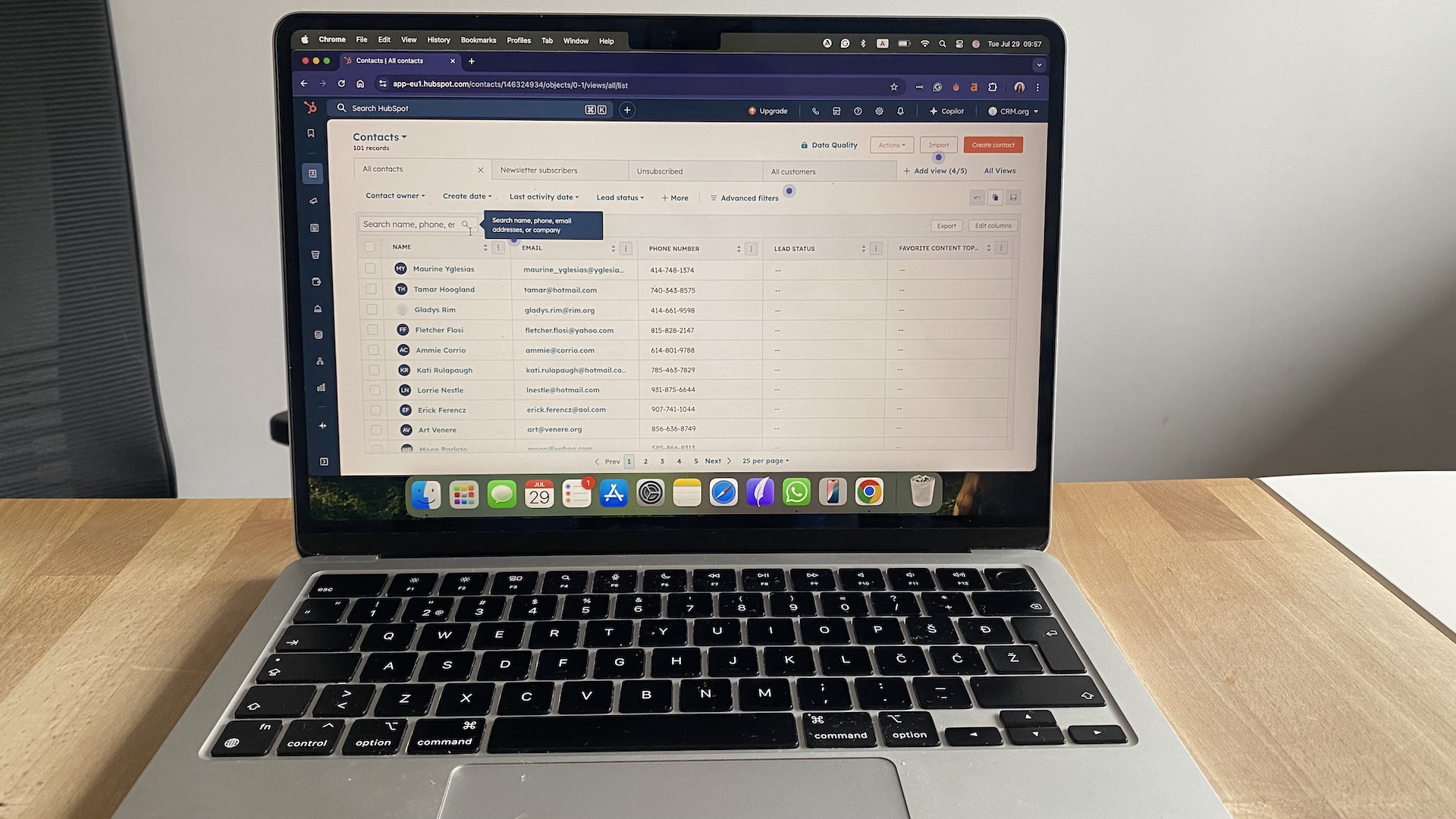
Pros
- Free plan includes pipelines, email sync, and task tracking
- Gmail/Outlook integration logs emails instantly—no manual BCCs
- Expands into marketing and automation hubs as your team grows
Cons
- No IDX or MLS integration out of the box
- Advanced reporting and workflows require paid tiers
- Default deal stages don’t fit real estate until customized
HubSpot is often where new agents or small brokerages start, because the free plan isn’t stripped down—it actually works. In testing, setup took less than 15 minutes: I built a pipeline, imported contacts, and connected Gmail. The moment I sent a test email, it logged automatically in the client record. That instant visibility was one of those “small but satisfying” moments that makes daily work easier.
For real estate, pipelines need tweaking. By default, stages are labeled for generic B2B deals, so I customized them into “Listing signed → Showing → Offer received → Closing.” Once set, dragging deals across stages felt intuitive and gave a clean snapshot of where each client stood. Tasks tied to contacts helped me track showing reminders and follow-ups without extra calendar juggling.
Where HubSpot shines is marketing. Even free users get email templates, open tracking, and basic automations. Paid tiers unlock sequences and playbooks—useful if you’re running a team or want structured nurture campaigns.
The friction? No IDX or MLS connection, so property alerts and saved search emails require another tool.
Pricing
Free forever for 2 users. Paid plans start at $15/user/month.
Helpful next steps
- Read our HubSpot CRM review
- Sign up for the HubSpot CRM free plan
Visit site
Go to HubSpot's official website
Best real estate CRM software for AI lead scoring
Freshsales
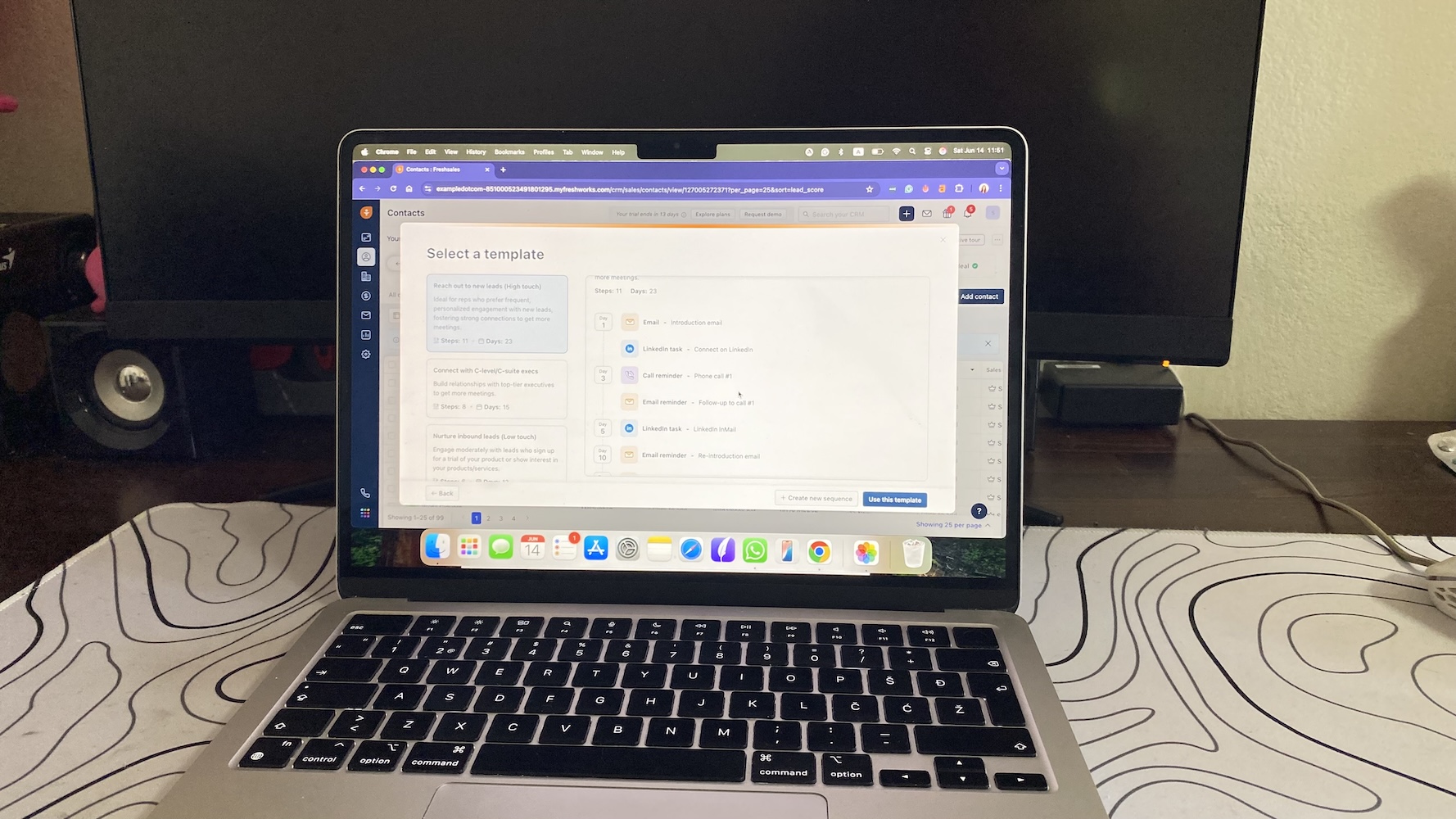
Pros
- Free plan supports 3 users with built-in phone and email
- AI-powered lead scoring highlights hot buyers and sellers
- Clean, reliable mobile app for agents on the go
Cons
- No IDX/MLS integration out of the box
- Transaction checklists and e-signature require third-party tools
- Advanced automation is paywalled on higher tiers
Freshsales isn’t built specifically for real estate, but once tailored it fits smaller teams and brokerages surprisingly well. Setup was quick: importing contacts via CSV was painless, and connecting Gmail pulled in messages instantly.
Every email, call, and text synced to the contact record without me lifting a finger. The first time I saw an entire thread appear automatically in the timeline, it felt like the CRM was quietly doing the admin work I usually forget.
The AI lead scoring was more than a gimmick. Leads who opened listing emails or clicked property links floated to the top of my queue. On the mobile app, those same scores showed right beside names, which made callbacks on the road feel more strategic.
Pipelines needed customization: default “deal” stages didn’t make sense until I rebuilt them as “New inquiry → Showing scheduled → Offer submitted → Closed.”
Transaction checklists and e-signatures aren’t built-in—you’ll need DocuSign or another add-on. And without IDX integration, property alerts require separate software, which adds a layer of double work if you’re running volume.
Still, for a free plan, Freshsales gives agents more out of the gate than almost any general CRM. Once customized, it balances ease of use with just enough automation to keep you sharp.
Pricing
Free for up to 3 users. Paid plans start at $9/user/month.
Helpful next steps
- Read our Freshsales review
- Sign up for the Freshsales free plan
Visit site
Go to Freshales' official website
Choosing the right real estate CRM software
Here’s the truth: CRMs aren’t magic bullets. They won’t hand you clients or close deals on autopilot. What they can do is quietly remove friction—logging calls, firing off reminders, and making sure no lead drifts away unnoticed. It’s not glamorous, but that kind of consistency is what compounds into more closings and repeat clients.
If you’re unsure where to start, don’t just sign up for free trials and click around. Map your last three deals on paper. Where did the leads come from? Where did you lose time? What slipped through the cracks? Then match those pain points against the tools we’ve reviewed. Suddenly, the “right CRM” stops being a guess and becomes an obvious fit.
The smartest move isn’t picking the system with the most features—it’s choosing the one that solves your bottlenecks today and won’t get in your way tomorrow.
Looking for more guidance? You might also like:
FAQs on CRM software for realtors
1. Will a CRM actually help me close more deals, or just add busywork?
A CRM won’t hand you clients—it keeps you from losing them. The real gain is speed-to-lead: texts or emails firing within seconds so prospects don’t drift. Use it as an assistant that handles follow-up and logging. If you’re disciplined, the extra deals it saves will outweigh the clicks.
2. What if I spend weeks setting this up and my team refuses to use it?
This is a broker’s nightmare. Adoption fails when a CRM feels like extra work. Test-drive with two agents before rollout: let them book showings, send texts, log calls. If it saves them clicks, they’ll use it. Tools like Wise Agent or HubSpot are lightweight; Zoho or Salesforce require training but scale better.
3. How do I know if a CRM is secure enough for sensitive client data?
Closings involve IDs, financial docs, and signatures—prime targets for hackers. Choose a CRM with encryption, role-based permissions, and secure e-sign integrations like DocuSign. Ask vendors directly: “Are you SOC 2 or GDPR compliant?” If they can’t answer clearly, don’t risk it. Protecting client trust is non-negotiable in this business.
4. Will this CRM still work when I double my leads or add more agents?
Growth exposes weak CRMs fast. Solo agents may be fine with LionDesk or Wise Agent, but brokerages need lead routing and accountability like Follow Up Boss or Zoho. Ask: can it handle 10,000 contacts without lag? Can I add agents mid-year without renegotiating? Choose software that won’t crumble as you scale.
5. What if I waste money because the CRM doesn’t fit my workflow?
Plenty of agents abandon CRMs after a month. Avoid that by testing with real deals, not demo data. Import a few contacts, rebuild your pipeline (“listing → showing → offer → close”), and send test follow-ups. You’ll know quickly if it saves time or adds hassle. Most vendors will extend trials if you ask.




